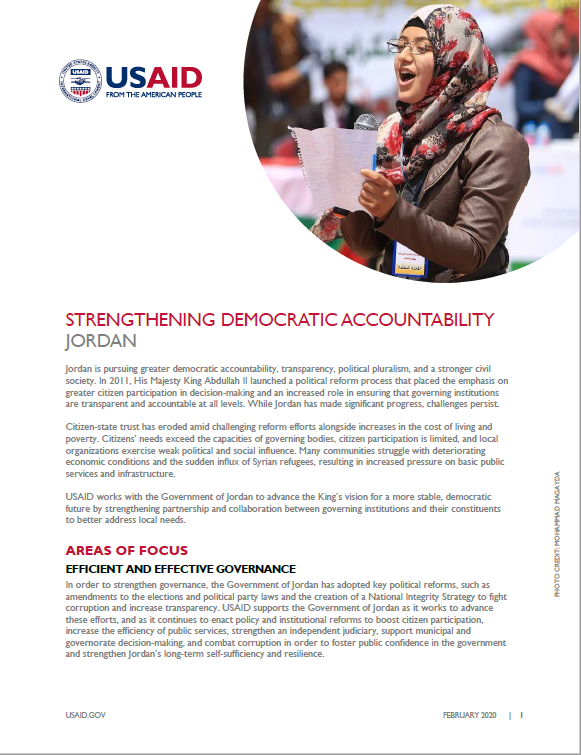Speeches Shim

BACKGROUND
Jordan is pursuing greater democratic accountability, transparency, political pluralism, and a stronger civil society. In 2011, His Majesty King Abdullah II launched a political reform process, seeking to shift the social contract in Jordan to one that places the emphasis on greater citizen participation in decision-making and an increased role in ensuring that governing institutions are transparent and accountable at all levels.
While Jordan has made significant progress, many challenges remain. Citizens’ needs exceed the capacities of governing bodies, citizen participation is limited, and local organizations exercise weak political and social influence. Many communities struggle with deteriorating economic conditions and the sudden influx of Syrian refugees, resulting in increased pressure on basic public services and infrastructure.
USAID works with the Government of Jordan to advance the King’s vision for a more stable, prosperous and democratic future by strengthening partnership and collaboration between governing institutions and their constituents to better address local needs.
AREAS OF FOCUS
Strengthening Democratic Accountability ![]() (pdf - 190k)
(pdf - 190k)
Efficient and Effective Governance
In order to strengthen governance, the Government of Jordan has passed key political reforms, such as the National Decentralization and Municipalities Law, amendments to the elections and political party laws, and the creation of a National Integrity Strategy to fight corruption and increase transparency. USAID supports the Government of Jordan as it continues to enact policy and institutional reforms to increase citizen participation, further electoral reform, strengthen an independent judiciary, support decentralization, and combat corruption in order to foster public confidence in the government and strengthen Jordan’s long-term self-sufficiency and resilience.
Strong Civil Society and Advocacy
Civil society in Jordan has made significant progress in recent years, with increased public advocacy, growing mobilization of youth and women, and an exponential increase in the number of civil society organizations. Still, civil society organizations exercise weak influence, limiting the ability of Jordanians to provide input on issues affecting their daily lives. USAID strengthens civil society in Jordan and helps communities make their voices heard by creating a network of trainers to build the capacity of organizations to conduct advocacy campaigns and by training local organizations and community members to develop relevant initiatives.
Inclusive Political Engagement
Citizen participation in Jordanian politics remains limited, particularly among women, youth, and people with disabilities. USAID works with the Government of Jordan to strengthen political engagement at all levels so that governing institutions effectively reflect and respond to the everchanging needs of the population. These include activities such as youth discussions on civic engagement; the development of high school curricula on democracy, human rights, and electoral procedures; and helping the Women’s Caucus in Parliament advocate for women’s issues.
NOTEWORTHY ACHIEVEMENTS:
-
In 2006, only six percent of judges in Jordan were women. USAID increased participation of women in law through the Future Judges Scholarship Program for the study of international law, while also supporting the Government of Jordan to introduce merit-based hiring for judicial appointments, resulting in an increase in female judge appointment. By 2018, female representation had more than tripled with women constituting 22 percent of Jordan’s judges.
-
Article 308 of the Jordan Penal Code allowed perpetrators of sexual assault to escape punishment if they married their victims. The Sisterhood is Global Institute Jordan applied strategic advocacy training from USAID to its efforts to lead a coalition of 120 local organizations in local and national advocacy against the article, resulting in its abolishment in 2017.
-
USAID encourages youth to raise their voices and participate in local elections by conducting civic engagement activities in universities and high schools. Across all governorates, youth voter turnout in the 2016 and 2017 elections exceeded the national average at 33 percent, compared to a national average of 31.7 percent in 2017; and 37.9 percent, compared to 36.1 percent in 2016.
-
USAID helped Jordan establish and strengthen the Independent Election Commission and engaged more than 3,000 officials, activists, and youth to help inform election reform efforts. As a result, the 2016 parliamentary elections, the first elections to be held after significant changes to improve the electoral process, were judged credible by international observers. USAID also supported the commission to engage 19,000 youth in voter outreach activities for the 2017 elections.



Comment
Make a general inquiry or suggest an improvement.